In my opinion, the closed registry was a dirty pool subversion of a relatively reasonable compromise, and illustrates a serious downside of allowing administrative agencies to have broad discretion in interpreting black letter law. On the other hand, I don't agree with the idea of trying to codify everything in the actual law, because this ends up with the opposite BS where the details of the law are written by politicians and lawyers who haven't the slightest idea how the thing actually works (to wit, the legal designation of certain single-shot firearms as 'assault weapons' because idiot lawmakers included them on a codified listing).
You are using an out of date browser. It may not display this or other websites correctly.
You should upgrade or use an alternative browser.
You should upgrade or use an alternative browser.
United States 2nd Amendment Legal Cases and Law Discussion
- Thread starter bullethead
- Start date
More options
Who Replied?
Threadmarks
View all 37 threadmarks
Reader mode
Reader mode
Recent threadmarks
New Mexico public carry ban on hold FBI/NICS Update 2024 - ATF Town Hall New Mexico "Gas Operated Semi-Auto" Ban Bill Analysis Illinois Assault Weapon and Magazine Ban Ruled Unconstitutional Trump 2nd Term: Attorney General Restablishing 2A Rights Restoration Process Robert Leider hired as Chief Counsel for ATF President Trump Proposes 28% ATF Budget Cut Rare Breed Triggers settles Forced Reset Trigger case with governmentPeaceMaker 03
Well-known member
The NFA is a joke from a constitutional perspective, only political shenanigans allowed it to go forward, and the courts ignoring any case that comes close to ruling on it are keeping it on life support.
That also goes to the area of the ATF, a bureaucratic institution with legislative, judicial, and executive power over a constitutionally protected liberty.
Federal agencies have sidestepped the separation of power, bedrock of the federal government rolled into organization run by the bureaucracy of unelected officials.
That also goes to the area of the ATF, a bureaucratic institution with legislative, judicial, and executive power over a constitutionally protected liberty.
Federal agencies have sidestepped the separation of power, bedrock of the federal government rolled into organization run by the bureaucracy of unelected officials.
Again, I'd strongly argue that administrative agencies are necessary in handling laws that inherently have complex day-to-day operations. You could never run something like aviation safety regulations without an agency.
Doomsought
Well-known member
There needs to be strict limitation on what can be regulated:
The regulation must produce a grantee which prevents a risk
The risk must have a greater than 50% chance of causing death or grievous injury
The Risk must be of accidental harm
All of the above elements must be provable
The regulation must produce a grantee which prevents a risk
The risk must have a greater than 50% chance of causing death or grievous injury
The Risk must be of accidental harm
All of the above elements must be provable
PeaceMaker 03
Well-known member
“The Bureaucracy must expand to support the Bureaucracy”….. with 5x the corruption and graft. Except it is now not illegal to operate in a manner that would cause charges, fines, and jail time for a person or company.
Until FDR came along the federal government followed the Constitution, specifically the 10th Amendment.
He instituted the picket fence policy, Summed up as I am not a judge so I do not have to worry about what I do being constitutional, let SCOTUS figure it out.
Which is a direct violation of sworn oath of office.
Knowing the SCOTUS, takes a few dozen cases a year.
Which help create a permanent bureaucracy not accountable to the people, who do what they want.
Example State department, Sec of State is appointed by the president, everyone else in positions of power is elite, Ivy League, better than the stupid peons.
- Who ignore, stall, or out right work against the president dependent on who it is.
- Remember when >3000 State dept. People refused to go do their jobs in Iraq and Afghanistan. Not one personalized or reprimanded? A 2LT & an SSG point man on a multiyear project, millions spent nothing ever built, ( but money came every year for it because it was State dept.), VTC back to Washington, file reports that are turned into reports at State that are complete fabrications from reality.
- How about State Department under Hillary? OPSEC…..Espionage. With entire departments of IT and security people, no one noticed the 8000 violations of classified data? That is 8000 felony violations for transmitting classified data over unclass systems, plus everyone not being reported by every person in the chain of emails with a security clearance.
Anyone in that government agency held accountable for any of that fiasco?
My security manager at the time kept a whiteboard of charges for Hillary's espionage violations, if she was a military security clearance holder, at max she was up to 240,000 year's of jail time just for leaked documents that would only need to prove “gross negligence”, not intent.
He was forced to take the whiteboard down about the time soldiers had been told to not look at any of the classified documents being published publicly on the internet, because you could be charged under the Espionage act.
Ironic since she was never charged and was able to run for office of president.
Until FDR came along the federal government followed the Constitution, specifically the 10th Amendment.
He instituted the picket fence policy, Summed up as I am not a judge so I do not have to worry about what I do being constitutional, let SCOTUS figure it out.
Which is a direct violation of sworn oath of office.
Knowing the SCOTUS, takes a few dozen cases a year.
Which help create a permanent bureaucracy not accountable to the people, who do what they want.
Example State department, Sec of State is appointed by the president, everyone else in positions of power is elite, Ivy League, better than the stupid peons.
- Who ignore, stall, or out right work against the president dependent on who it is.
- Remember when >3000 State dept. People refused to go do their jobs in Iraq and Afghanistan. Not one personalized or reprimanded? A 2LT & an SSG point man on a multiyear project, millions spent nothing ever built, ( but money came every year for it because it was State dept.), VTC back to Washington, file reports that are turned into reports at State that are complete fabrications from reality.
- How about State Department under Hillary? OPSEC…..Espionage. With entire departments of IT and security people, no one noticed the 8000 violations of classified data? That is 8000 felony violations for transmitting classified data over unclass systems, plus everyone not being reported by every person in the chain of emails with a security clearance.
Anyone in that government agency held accountable for any of that fiasco?
My security manager at the time kept a whiteboard of charges for Hillary's espionage violations, if she was a military security clearance holder, at max she was up to 240,000 year's of jail time just for leaked documents that would only need to prove “gross negligence”, not intent.
He was forced to take the whiteboard down about the time soldiers had been told to not look at any of the classified documents being published publicly on the internet, because you could be charged under the Espionage act.
Ironic since she was never charged and was able to run for office of president.
PeaceMaker 03
Well-known member
Courts ruled regulations do not apply to individuals, Rodrigez<sp> v. Board of Labor.There needs to be strict limitation on what can be regulated:
The regulation must produce a grantee which prevents a risk
The risk must have a greater than 50% chance of causing death or grievous injury
The Risk must be of accidental harm
All of the above elements must be provable
Regulations apply to Government and legal fiction persons aka. Corporations.
Although it is outright ignored and applied to individuals constantly.….. Like the 2nd amendment and 10th amendment.
The entire point of her having a private server was so that the State Department's security people COULDN'T track her activities. They didn't have visibility onto her server and thus couldn't track them.- How about State Department under Hillary? OPSEC…..Espionage. With entire departments of IT and security people, no one noticed the 8000 violations of classified data? That is 8000 felony violations for transmitting classified data over unclass systems, plus everyone not being reported by every person in the chain of emails with a security clearance.
Clinton wasn't the first person to do this in the government either, there were W. Bush officials who set such things up. Pre-2010s government networking was a bit of a wild west, and things that we know are not best practices were allowed then due to many in the government at the time not having a good basic knowledge of networking and security.
IIRC, it was actually Woodrow Wilson and/or Calvin Coolidge that really got the admin state going.Until FDR came along the federal government followed the Constitution, specifically the 10th Amendment.
It really took off during the Depression era when people wanted to give the Federal government more power.
IIRC, Coolidge was actually pretty solid, it was Wilson.IIRC, it was actually Woodrow Wilson and/or Calvin Coolidge that really got the admin state going.
It really took off during the Depression era when people wanted to give the Federal government more power.
Skallagrim
Well-known member
Yeah, I think @bullethead meant Hoover. That would be more accurate. Coolidge was one of the most dedicated 'small government' presidents. (Although not as dedicated as Based Cleveland.)IIRC, Coolidge was actually pretty solid, it was Wilson.
Probably. It's been forever since I read the book about the AM/FM wars that mentioned which president post-Wilson was super into the administrative agencies, and all I remembered was that it was one of the three(?) presidents between Wilson and FDR.Yeah, I think @bullethead meant Hoover. That would be more accurate. Coolidge was one of the most dedicated 'small government' presidents. (Although not as dedicated as Based Cleveland.)
The 9th Circuit seems to want to get its balls busted by the Supreme Court over the California magazine ban:







Article: 9th circuit en banc panel is taking back Duncan as a comeback case. Stay extended to October 10. Our opp due September 30.
Bad news is, that's a tough 11-judge panel for us. Good news is, back to SCOTUS much quicker.
Chances of new freedom week given this development are quite low.
Article: To anyone not clear - this will be the exact same en banc panel as last time the 9th heard Duncan.
I imagine if there is no movement of their positions, the case will be very enticing for SCOTUS.
Article: LEGAL ALERT: The Ninth Circuit has assigned the lawsuit that struck down California's magazine ban to the same en banc panel as before, extended the stay until at least October 10th, and set a briefing schedule. Four judges dissent.
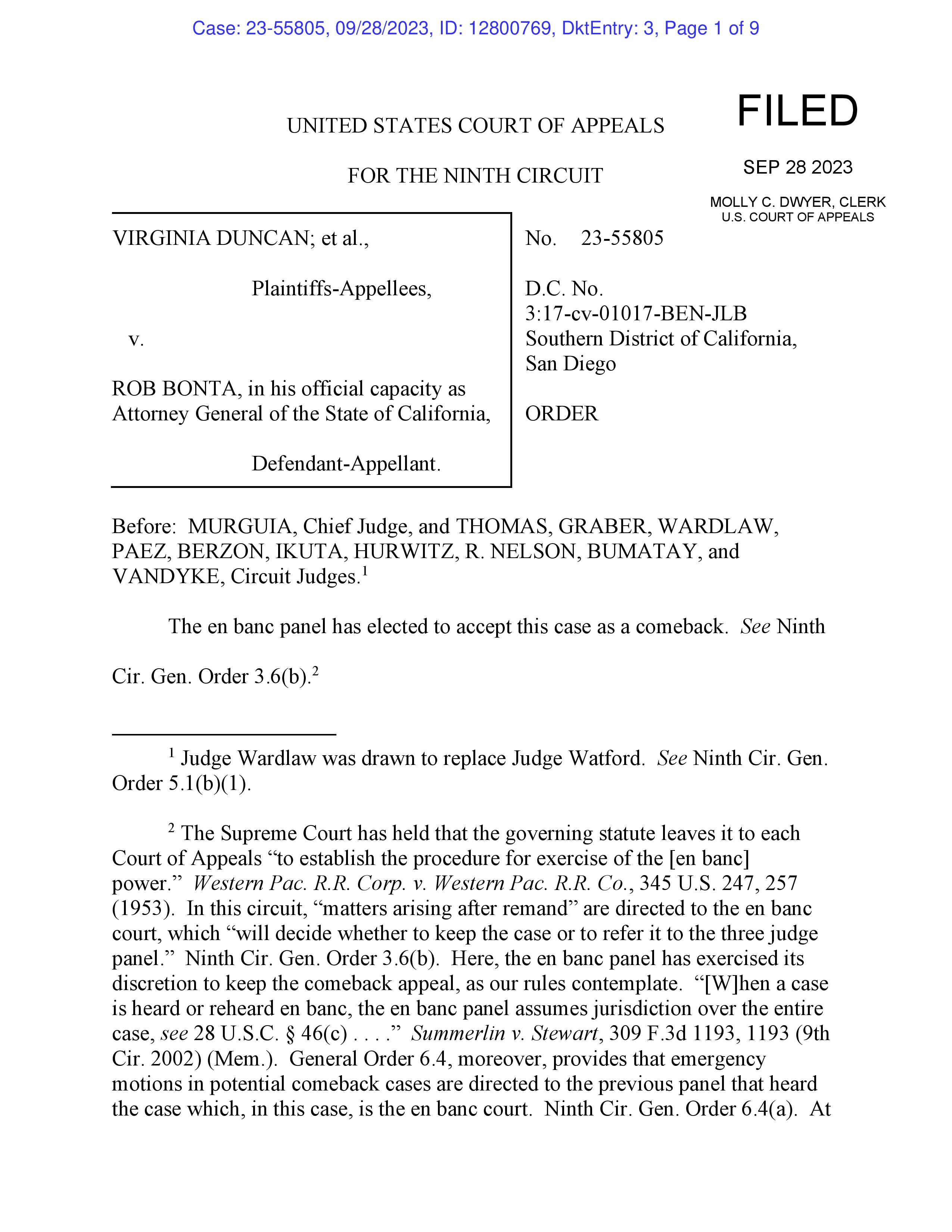
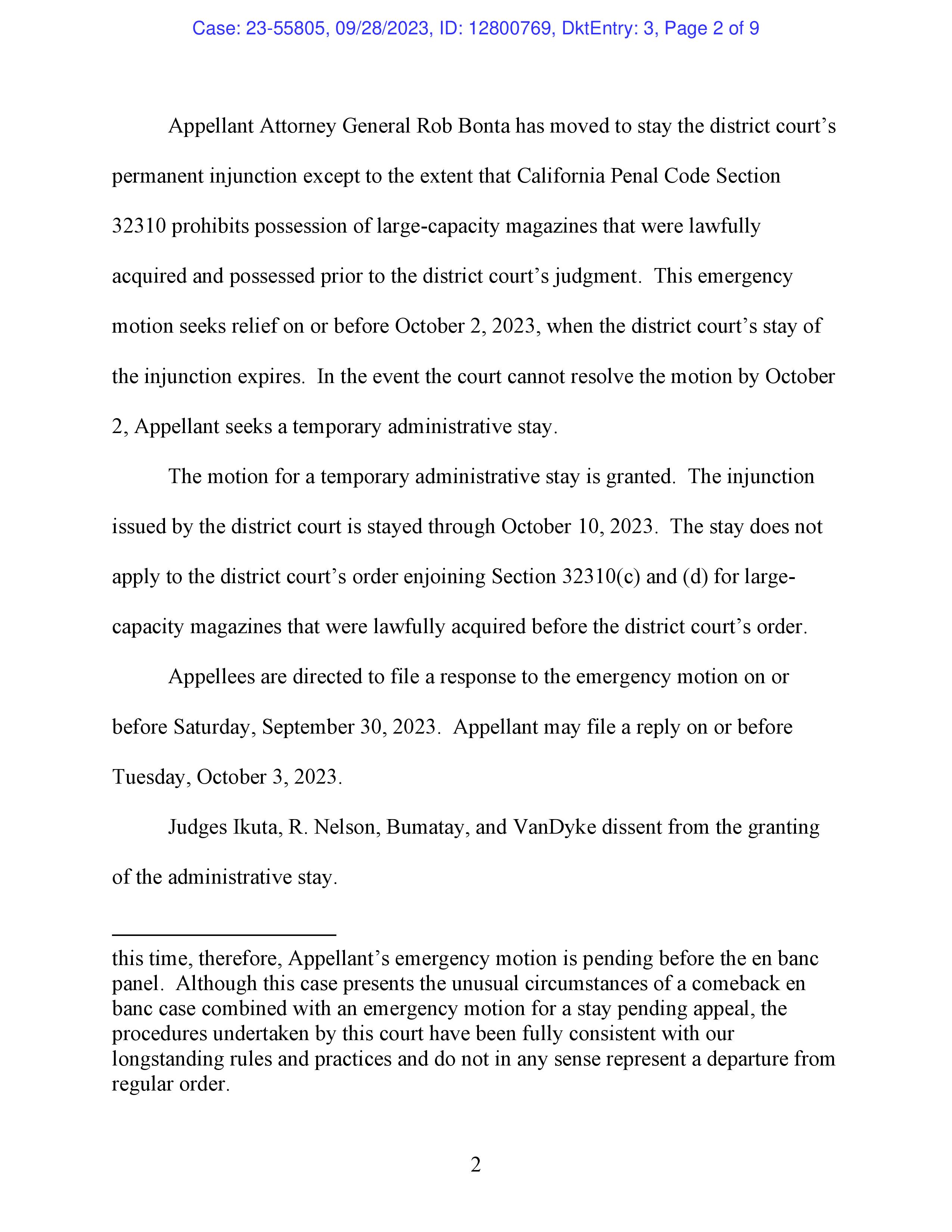
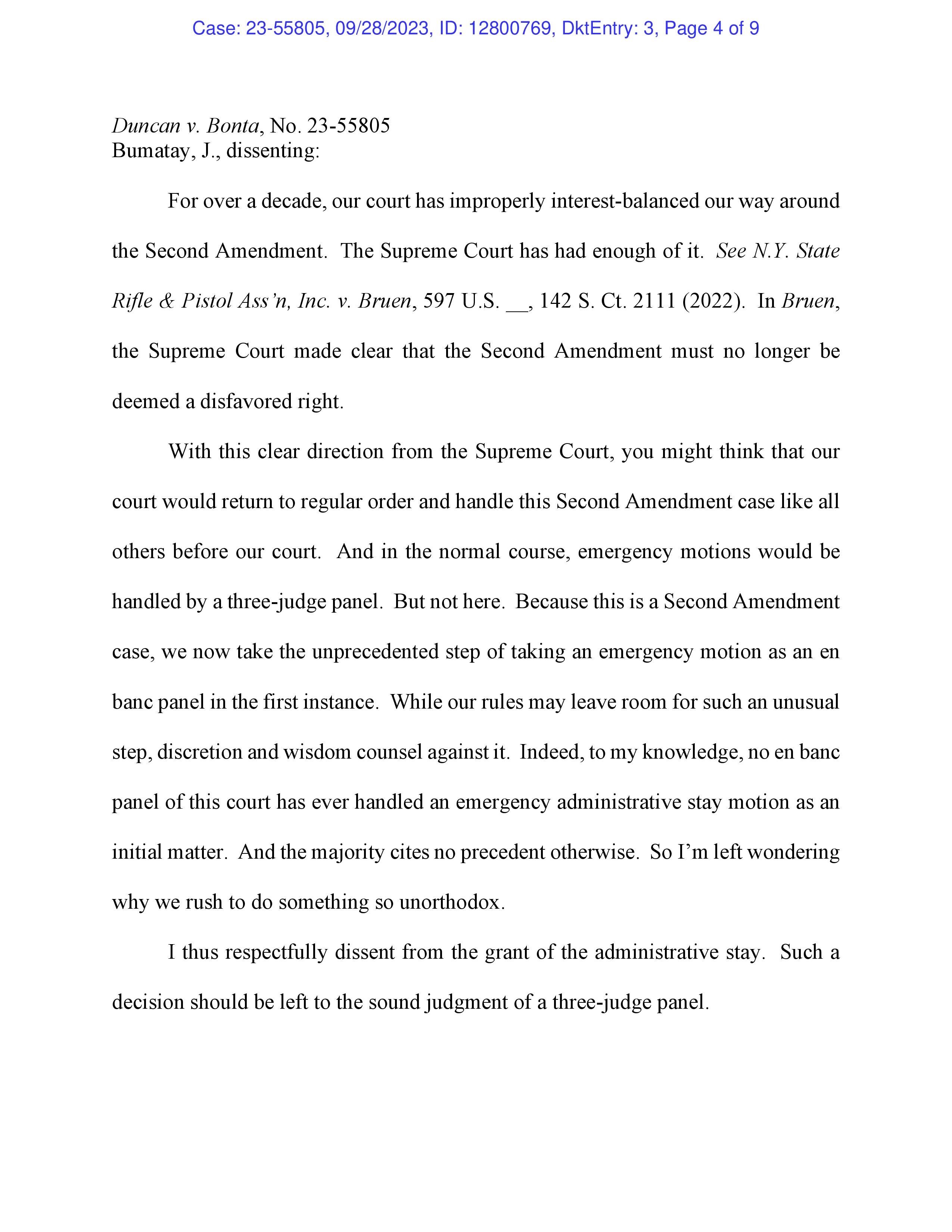
Article: Judge Bumatay: "Indeed, to my knowledge, no en banc panel of this court has ever handled an emergency administrative stay motion as an initial matter. And the majority cites no precedent otherwise. So I’m left wondering why we rush to do something so unorthodox."
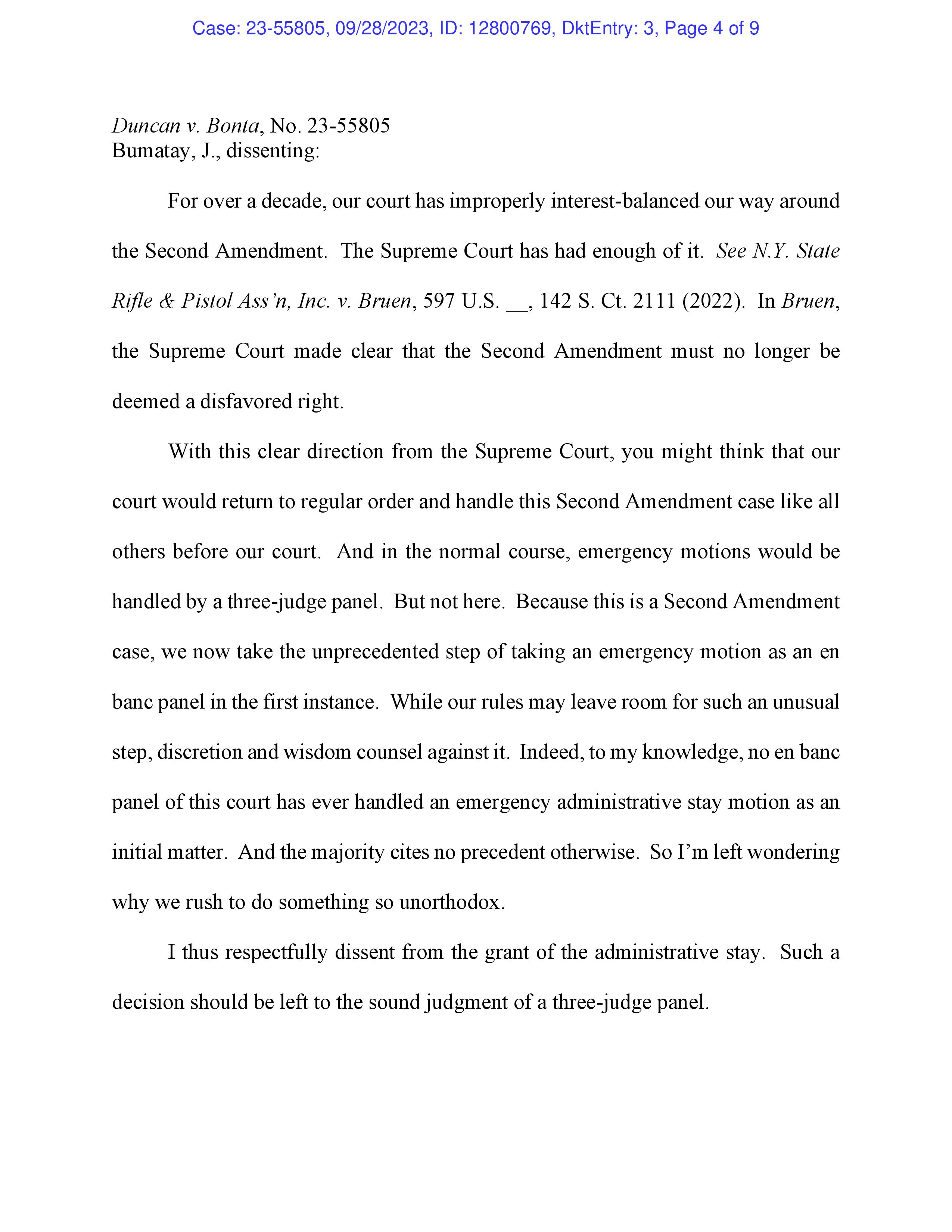
Article: Judge VanDyke: "The irregularities in this case run much deeper—indeed, all the way back to when this case was first called en banc. This en banc panel was born in illegitimacy, and this case should never have been taken en banc in the first place."

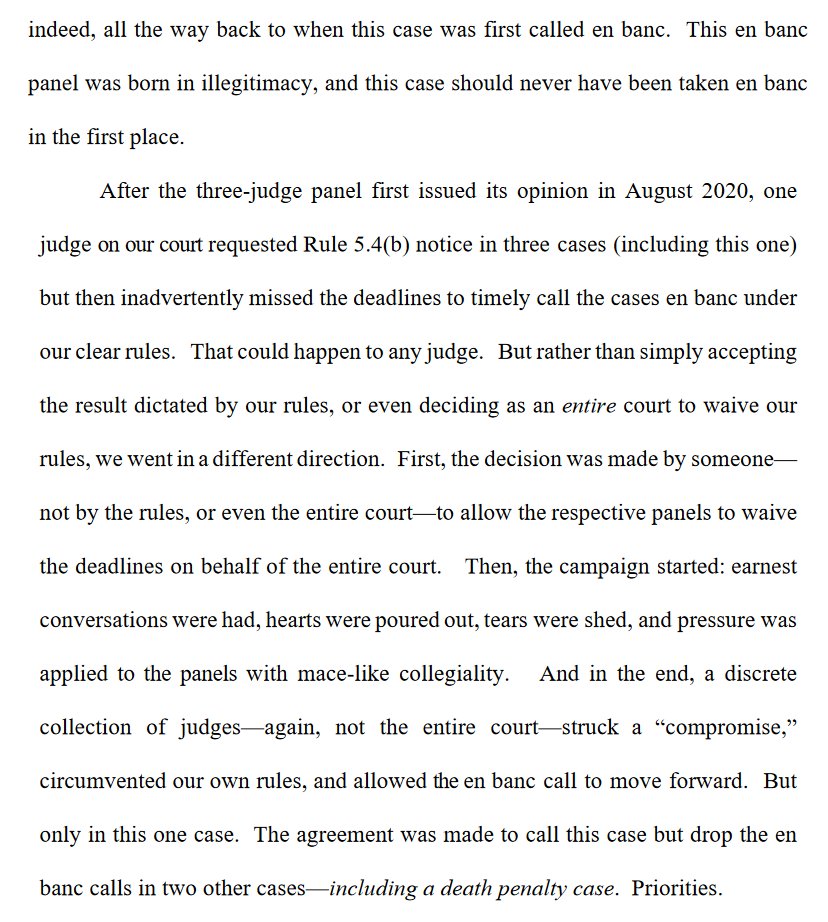
Article: Judge VanDyke closes out his dissent with a scorching critique of his colleagues’ actions: “The story of the Second Amendment in this circuit has been a consistent tale of our court versus the Supreme Court and the Constitution. That tale continues today, and will continue as long as a number of my colleagues retain the discretion to twist the law and procedure to reach their desired conclusion. As uncomfortable as it is to keep pointing that out, it is important the public keeps being reminded of that fact.”
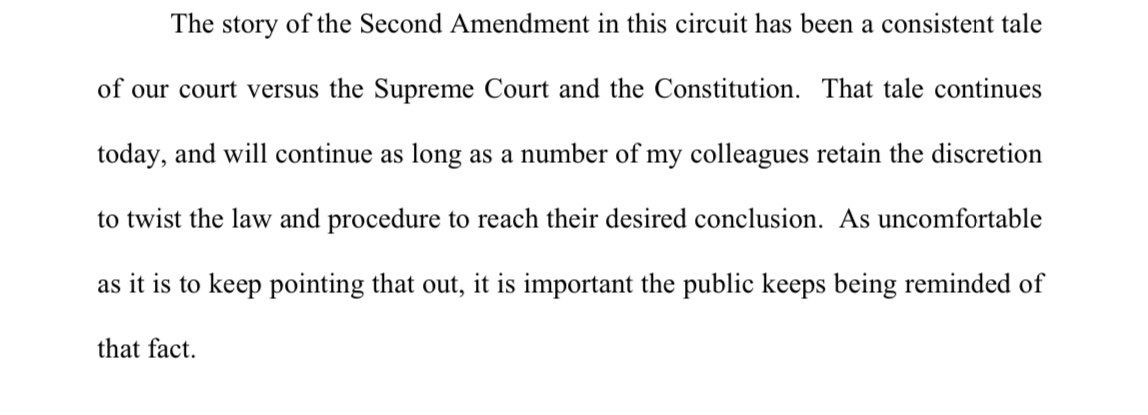
En banc appeal is entirely at the discretion of the majority of the Court, so there's really no sense whining about either getting or not getting an en banc. Unofficially, the more controversial and important a case is, the more likely it is to be en banc.
@ShadowArxxy I think the bigger problem is that it's going to the exact same people. Wouldn't they need to be "randomly" assigned from the available judges in the Circuit? It's pretty clear that the "majority of the Court" are attempting to guide judgements into a, let's say, more likely outcome.
Yeah, the whole point of pointing out that it's the same panel is that these guys ruled against Benitez's interpretation the first time, so they're likely to do so again, barring SCOTUS sorting out Rahimi before they get to it.
Dunno if the en banc panel reversing Benitez's ruling would allow the court to deal with it in the upcoming term, but it'd get on the docket a lot faster than other cases.
Dunno if the en banc panel reversing Benitez's ruling would allow the court to deal with it in the upcoming term, but it'd get on the docket a lot faster than other cases.
@ShadowArxxy I think the bigger problem is that it's going to the exact same people. Wouldn't they need to be "randomly" assigned from the available judges in the Circuit? It's pretty clear that the "majority of the Court" are attempting to guide judgements into a, let's say, more likely outcome.
In most Circuits, the en banc panel consists of all the active sitting judges. This is not practical because the Ninth is vastly larger than any other circuit -- it was assigned a huge territory because the West was sparsely settled back in the day, and for political reasons (from both sides) this has never been changed. Ninth Circuit en banc is a random selection of 11 out of the 29 judicial positions.
In this case, the en banc panel is not a new randomization because the case is what is called a "comeback" -- there were earlier appeals in this case that were already appealed en banc, so there is already a panel set. Letting them "draw again" would in fact be giving this case special treatment in violation of court procedures.
Ah, I didn't realize that's how this worked. If that's the process, that's the process.In most Circuits, the en banc panel consists of all the active sitting judges. This is not practical because the Ninth is vastly larger than any other circuit -- it was assigned a huge territory because the West was sparsely settled back in the day, and for political reasons (from both sides) this has never been changed. Ninth Circuit en banc is a random selection of 11 out of the 29 judicial positions.
In this case, the en banc panel is not a new randomization because the case is what is called a "comeback" -- there were earlier appeals in this case that were already appealed en banc, so there is already a panel set. Letting them "draw again" would in fact be giving this case special treatment in violation of court procedures.
Ah, I didn't realize that's how this worked. If that's the process, that's the process.
It's fairly obscure knowledge; I only know the details because of a very memorable school field trip to the Ninth Circuit where the process was explained to us by one of the judges.
Vetrom
war
Is there a written treatment you could recommend about those reasons for which the ninth circuit was never split? I imagine there's political factors in the supreme court itself as well as the states (each justice oversees one of the circuits. Do they also allocate them?)It's fairly obscure knowledge; I only know the details because of a very memorable school field trip to the Ninth Circuit where the process was explained to us by one of the judges.
It goes back to the issues we've had with Congress for a while at this point: nobody in Congress wants to actually be responsible for anything, and restructuring the US Court system is one of those things that Congress can't pawn off on anyone, they have to do the hard work and horse trading to restructure things.Is there a written treatment you could recommend about those reasons for which the ninth circuit was never split? I imagine there's political factors in the supreme court itself as well as the states (each justice oversees one of the circuits. Do they also allocate them?)
The other thing is that the system as it stands, while awkward and on the surface imbalanced, tends to work. While it would help to restructure the Federal Court system and better balance the circuit courts there's no urgent actual NEED to. The system works, it handles the cases. And since it works and nobody wants to really open the can or worms up that restructuring the courts would entail, it's just put off and ignored.
Threadmarks
View all 37 threadmarks
Reader mode
Reader mode
Recent threadmarks
New Mexico public carry ban on hold FBI/NICS Update 2024 - ATF Town Hall New Mexico "Gas Operated Semi-Auto" Ban Bill Analysis Illinois Assault Weapon and Magazine Ban Ruled Unconstitutional Trump 2nd Term: Attorney General Restablishing 2A Rights Restoration Process Robert Leider hired as Chief Counsel for ATF President Trump Proposes 28% ATF Budget Cut Rare Breed Triggers settles Forced Reset Trigger case with governmentUsers who are viewing this thread
Total: 3 (members: 0, guests: 3)
